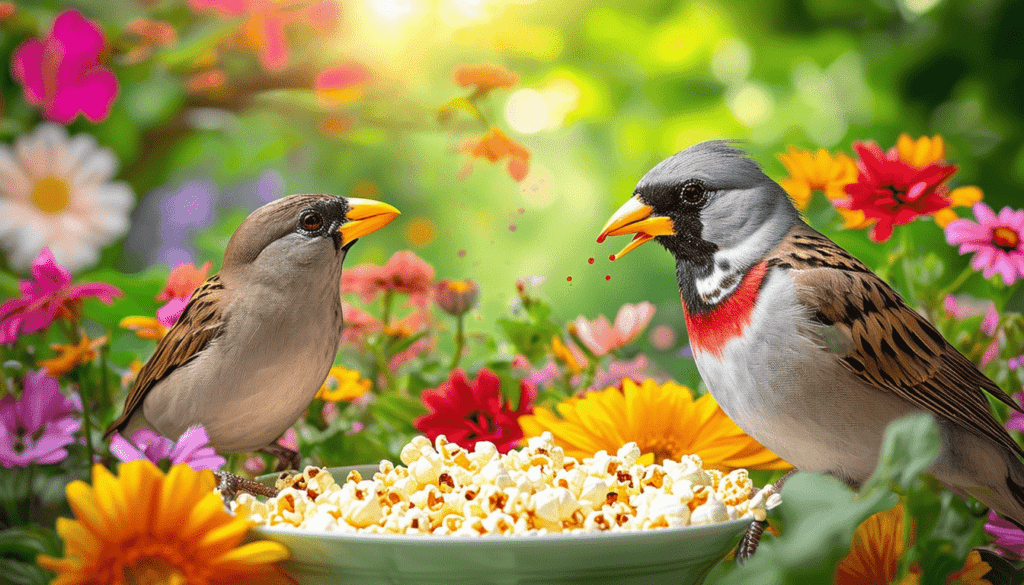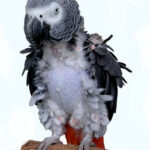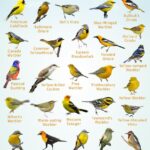Can Birds Eat Popcorn? Find Out Here!

In this article, we will explore whether birds can safely consume popcorn. We’ll provide information on the potential risks and benefits of feeding popcorn to birds, as well as alternative bird-safe treats. Let’s find out if popcorn is a suitable snack for our feathered friends!
Key Takeaways:
- Feeding popcorn to birds may pose potential risks such as choking hazards and high salt content
- Plain, unsalted popcorn may be safer for birds, but precautions must still be taken
- There are plenty of alternative bird-safe treats available, such as fruits, nuts, and specialized birdseed mixes
- To ensure the well-being of our birds, safe feeding practices such as portion control and avoiding harmful additives must be followed
- It’s essential to observe birds’ reactions to popcorn and respond accordingly. Every bird is different, and their preferences may vary.
Understanding the Bird’s Diet
When it comes to feeding our feathered friends, it’s important to understand their natural diet. Birds typically consume a variety of natural foods, including seeds, grains, fruits, and insects, providing them with a balance of necessary nutrients.
Offering natural bird food not only helps with their nutritional requirements but can also encourage their natural foraging behavior. Many pet stores offer specialized birdseed mixes that mimic the birds’ natural habitats, providing them with a diverse range of food to choose from.
It’s important to keep in mind that different bird species may have unique feeding preferences. Some species may prefer nuts, while others may favor fruits or insects. By expanding the variety of food we offer to our feathered friends, we can ensure they get the necessary nutrition and provide them with extra stimulation and enrichment.
The Risks of Feeding Popcorn to Birds
Popcorn may seem like a harmless treat, but there are potential risks associated with feeding it to birds. One of the most significant dangers is the risk of choking. Birds, especially smaller ones, can easily choke on popcorn kernels due to their small size and shape. This can lead to serious health issues or even death in some cases.
Another issue to consider is the high salt and butter content found in many popcorn types. These additives can be harmful to birds and lead to digestive issues, including dehydration and diarrhea. Too much salt can even be toxic to birds, causing seizures and other serious health problems.
| Risks | Precautions |
|---|---|
| Choking hazards | Only feed popcorn to birds that are large enough to handle it and avoid giving them whole kernels. Instead, break the popcorn into smaller pieces before offering it. |
| High salt content | Stick to plain, unsalted popcorn or other alternative bird-safe treats to avoid overloading birds with salt. |
| Buttered popcorn | Avoid giving birds popcorn with added butter or other flavorings, as these can be harmful to their digestive systems. |
By being aware of the potential risks and taking precautions, we can ensure that birds stay safe while enjoying their snacks. In the next section, we’ll explore whether plain, unsalted popcorn is a viable snack option for birds, and discuss alternative treats that are safer and more nutritious for them.
Can Birds Eat Plain, Unsalted Popcorn?
We’ve established that popcorn can pose risks to birds due to choking hazards and high salt content found in flavored varieties. However, what about plain, unsalted popcorn? Is it safe for birds to consume?
Plain popcorn without any additives or flavorings may be safer for birds to consume in moderation compared to salted or buttered popcorn. While it’s not a natural food source for birds, it may offer a small nutritional boost.
Popcorn is a whole grain, which means it contains fiber, protein, and other essential nutrients. However, it’s important to note that popcorn alone cannot provide all the necessary nutrients needed in a bird’s diet.
Nutritional Value of Popcorn
Let’s take a look at the nutritional value of plain, unsalted popcorn:
| Nutrient | Amount per 1 cup (8g) |
|---|---|
| Calories | 31 |
| Protein | 1g |
| Fiber | 1g |
| Fat | 0.4g |
| Carbohydrates | 6g |
As you can see, popcorn does offer small amounts of essential nutrients, such as fiber and protein. However, it’s important to note that plain, unsalted popcorn cannot replace a bird’s natural diet.
In conclusion, while plain popcorn may be safer for birds compared to flavored varieties, it should still be fed in moderation and not replace a bird’s natural diet. It’s also essential to take precautions, such as feeding small pieces to avoid potential choking hazards.
Bird-Safe Alternatives to Popcorn
As we’ve discussed, birds should avoid consuming popcorn due to the potential risks it poses. But don’t worry- we’ve gathered a list of bird-safe alternatives! These options can provide both nutritional value and entertainment for our feathered friends.
Fruits for Birds
Fruits are a fantastic option for birds, as they are high in essential vitamins and nutrients. Some safe fruit options for birds include:
- Berries (strawberries, blueberries, raspberries, etc.)
- Apples
- Oranges
- Bananas
- Mangoes
Nuts for Birds
Nuts can be an excellent source of healthy fats and additional nutrients for birds. However, it’s essential to avoid salted or flavored varieties. Here are some types of nuts that birds can safely consume:
- Almonds
- Walnuts
- Pistachios
- Cashews
Birdseed Mixes
Specialized birdseed mixes are designed to provide birds with the necessary nutrients for a balanced diet. These mixes often include seeds, grains, and other bird-safe ingredients. Look for mixes designed for specific bird species to ensure optimal nutrition.
Safety and portion control are still essential when feeding these alternatives to birds. When introducing new foods to a bird’s diet, always observe their reaction and introduce in small amounts. By providing bird-safe treats, we can ensure the health and well-being of our feathered friends!
Tips for Safely Sharing Snacks with Birds
If you’ve decided to share snacks with birds, follow these safe feeding practices:
- Portion control: Offer small amounts of food to prevent overconsumption. Remember that treats should not replace a bird’s regular diet.
- Avoid harmful additives: Stay away from flavored, salted, or buttered popcorn and other harmful additives.
- Minimize potential risks: Choose bird-safe treats such as fruits, nuts, or specialized birdseed mixes. Monitor the birds’ reactions to ensure they are comfortable and able to consume the snack.
By following these tips, you can safely share a snack with our feathered friends without any harm.
Observing Birds’ Reactions to Popcorn
When offering popcorn to birds, it’s essential to pay attention to their responses and feeding preferences. Every bird is unique, and their reactions may vary from species to species. Some birds may eagerly accept popcorn as a treat, while others may seem hesitant or disinterested.
One clear sign that a bird is enjoying popcorn is if they consume it eagerly without any signs of discomfort. However, if a bird appears hesitant to approach or consume popcorn, it may be a sign that they’re not particularly fond of it. In this case, it’s best to remove the popcorn and offer an alternative snack that the bird may enjoy more.
On the other hand, it’s essential to observe any signs of discomfort that birds may exhibit while consuming popcorn. If a bird is struggling to crack or break the kernels, it may be a choking hazard and potentially lead to respiratory problems. Additionally, birds that consume popcorn with added salt or butter may experience digestive issues or other discomfort.
Overall, it’s crucial to be attentive and responsive to birds’ needs when sharing snacks. By observing their reactions and taking precautions to limit potential risks, we can ensure that our feathered friends receive the best possible care.
Conclusion
After exploring whether birds can eat popcorn, we’ve learned that while it’s technically possible, it’s not recommended due to the potential risks involved. Popcorn can pose choking hazards, and the high salt and butter content found in many types of popcorn can be harmful to birds. Understanding the bird’s natural diet and nutritional needs is essential when choosing suitable bird treats.
If you still want to feed popcorn to birds, it’s crucial to follow safe feeding practices, such as portion control, avoiding harmful additives, and monitoring birds’ reactions. However, we recommend opting for bird-safe alternatives such as fruits, nuts, and specialized birdseed mixes to ensure their well-being.
By being attentive and responsive to birds’ needs while sharing snacks, we can build a positive relationship with our feathered friends while keeping them healthy and safe.


